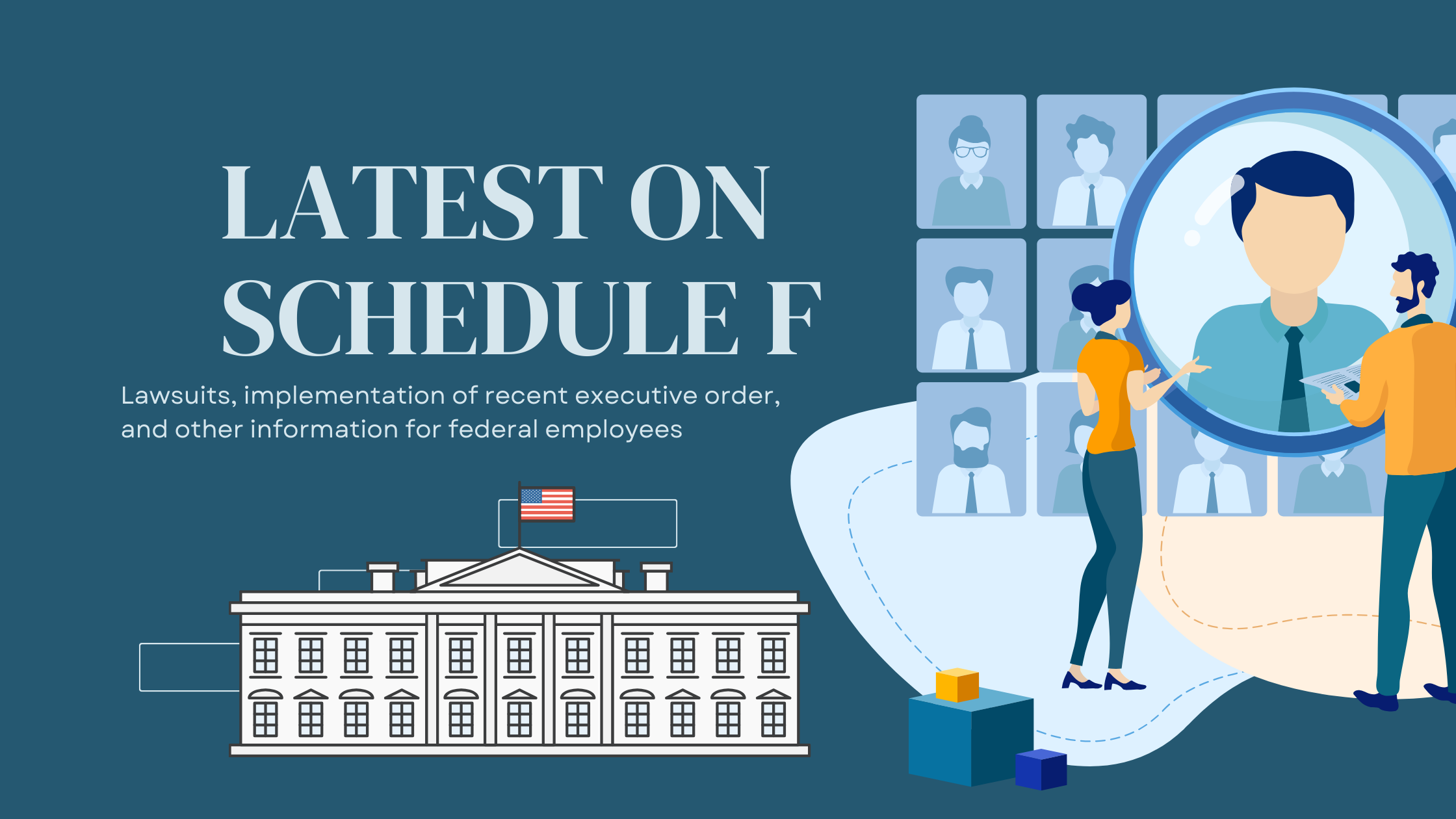Explore how the Trump Administration Executive Order on Schedule F positions impacts federal employees, stripping civil service protections and altering job security for federal workers.
Understanding Schedule F: Trump’s Executive Order Impact on Federal Employees
Schedule F, which reclassifies certain federal workers as “at will” employees and essentially makes them easier to fire, was introduced at the end of the first Trump administration. Despite OPM rules put in place by the Biden White House in spring of 2024, the current president quickly signed an executive order to reimplement the policy, claiming the executive branch has the authority to override OPM rules. This article will review current legal challenges to the rescheduling of the federal government’s workforce, how Schedule F is currently impacting personnel at different agencies, and other information regarding the controversial policy.
Lawsuits Related to Schedule F
Legal challenges to Schedule F have been mounting, particularly from federal worker advocacy groups like the National Treasury Employees Union (NTEU), which has filed a lawsuit against the US executive branch. Their case argues that reinstating Schedule F violates congressional intent and the Office of Personnel Management regulations put in place a year ago. The main claim of NTEU’s complaint is that the executive order goes beyond the authoritative boundaries of the President, undermining employees’ due process rights.
Stay informed about Federal Employee Benefits – Subscribe to Our Newsletter
Legal Case Against DOGE and Federal Staffing Cuts
As rumors circulate that Elon Musk is stepping down from his role as a “special government employee” to focus on SpaceX and Tesla, another lawsuit is challenging the establishment of the Department of Government Efficiency (DOGE), which is linked to Schedule F and reducing staff at federal agencies through RIFs (Reduction in Force). The main argument of the case is that the DOGE structure violates the Federal Advisory Committee Act, which governs the creation of government advisory panels. These legal actions highlight concerns about the erosion of merit-based civil service protections and the potential for political interference in federal employment.
Agency Leaders Rescheduled Position Descriptions
As the courts deliberate these cases, there have been recent developments regarding federal employment and Schedule F. Some agencies have started notifying employees about their designation under Schedule F, which is now referred to as “Schedule Policy/Career.” This policy, reinstated by President Trump, allows certain federal employees in policy-making roles to be classified as at-will employees, meaning they can be removed more easily.
For example, the National Oceanic and Atmospheric Administration (NOAA) recently informed some employees that because their roles are considered policy-related, they have been reclassified, potentially stripping them of civil service protections. Agency leaders across the federal landscape have seen their PD (position description) rescheduled from “A” to “F” so individuals more aligned with the White House’s objectives can be given leadership roles at federal agencies.
Plan for Retirement from the Federal Government – Register for a Free Online Federal Retirement Seminar!
What is Schedule F and How Does it Affect Federal Employees?
The reintroduction of Schedule F by the Trump administration marked a significant shift in how certain federal positions are classified and managed. This executive order, known as Executive Order 13957, aimed to redefine the landscape of the federal workforce by creating a new category of employment that could potentially alter the protections and stability traditionally associated with civil service positions. As we delve into the intricacies of Schedule F, it is crucial to understand its implications for federal employees, the motivations behind its introduction, and the potential future it holds for the civil service system.
Objectives Behind the Executive Order
President Donald Trump introduced Schedule F with the stated objective of improving the efficiency and accountability of the federal government. By creating a new category of employment for policy-determining and policymaking positions, the administration sought to ensure that federal agencies could more effectively implement the president’s agenda. The executive order was framed as a necessary reform to address perceived inefficiencies within the civil service system, allowing for a more agile and responsive government that could better serve the American people. However, this rationale was met with skepticism by some stakeholders, who viewed the move as an attempt to consolidate power within the executive branch.
Long-term Implications for Government Employees and Political Appointees
The long-term implications of Schedule F for government employees are a subject of ongoing debate. While the executive order was rescinded by President Biden through Executive Order 14003, the precedent set by its introduction continues to influence discussions about civil service reform. If reinstated or modified by future administrations, Schedule F could fundamentally alter the landscape of federal employment, affecting job security, career advancement, and the overall integrity of the civil service system. As such, federal employees and policymakers alike must remain vigilant in assessing the potential impacts of such changes on the public service and the American people.
How Schedule F Changes Civil Service Protections
Effects on Merit System Principles
After the 1881 assassination of President Garfield, public service shifted to a merit-based system, resulting in the federal workforce structure in place today. Schedule F poses significant challenges to the merit system principles that has underpinned the federal civil service for almost 150 years. By allowing for the reclassification of certain positions into the excepted service, the executive order effectively bypassed the competitive hiring processes that ensures fairness and impartiality in federal employment. This shift raised concerns about the erosion of merit-based hiring and promotion, as positions could be filled based on political considerations rather than qualifications and performance. The potential for increased political influence in personnel decisions threatened to undermine the integrity of the civil service, which is intended to operate independently of partisan interests.
Potential Risks to Civil Service Protections
The reclassification of positions under Schedule F introduced potential risks to civil service protections, particularly in terms of job security and due process. Employees in Schedule F roles faced the possibility of being dismissed without the procedural safeguards typically afforded to federal workers in the competitive service. This lack of protection heightened concerns about the vulnerability of career civil servants to political pressures and arbitrary decision-making. The potential for increased turnover and instability within federal agencies also posed risks to the continuity and effectiveness of government operations, as experienced personnel could be replaced with less qualified individuals.
What Are the Implications for Federal Employees in 2025?
Legislative Efforts to Reinstate Civil Service Protections
In response to the introduction of Schedule F, legislative efforts have been undertaken to reinforce civil service protections and prevent similar reclassifications in the future. The Saving the Civil Service Act, for example, was proposed to safeguard the merit system and ensure that federal positions remain subject to competitive hiring processes. Such legislative initiatives aim to provide a statutory framework that protects federal employees from arbitrary dismissal and political interference. The success of these efforts will depend on the willingness of lawmakers to prioritize the preservation of a nonpartisan and professional federal workforce.
Strategies for Navigating Policy Changes
Federal employees can take proactive steps to prepare for potential changes in Schedule F and other policy shifts that may affect their employment. Staying informed about legislative developments and executive actions is crucial for understanding the potential impact on job security and career prospects. Engaging with professional organizations and advocacy groups can provide valuable resources and support for navigating policy changes. Additionally, federal employees should consider pursuing professional development opportunities to enhance their skills and qualifications, thereby increasing their resilience in the face of potential reclassifications or job transitions.
Understanding Rights and Protections Under New Policies
Understanding the rights and protections available under new policies is critical for federal employees facing potential changes in Schedule F. Familiarizing oneself with the legal framework governing federal employment, including civil service protections and merit system principles, can empower employees to advocate for their rights and seek recourse in the event of unfair treatment. Staying informed about legislative efforts to reinforce civil service protections and engaging with policymakers can also contribute to shaping a more equitable and stable federal employment landscape. By taking an active role in understanding and navigating policy changes, federal employees can better protect their interests and contribute to the integrity of the public service.
Reach Out to Us!
If you have additional federal benefit questions, contact our team of CERTIFIED FINANCIAL PLANNER™ (CFP®), Chartered Federal Employee Benefits Consultants (ChFEBC℠), and Accredited Investment Fiduciary (AIF) professionals. At PlanWell, we are federal employee financial advisors with a focus on retirement planning. Learn more about our process designed for the career fed.
Preparing for federal retirement? Check out our scheduled federal retirement workshops. Sign up for our no-cost federal retirement webinars here! Make sure to plan ahead and reserve your seat for our FERS webinar, held every three weeks. Want to have PlanWell host a federal retirement seminar for your agency? Reach out, and we’ll collaborate with HR to arrange an on-site FERS seminar.
Want to fast-track your federal retirement plan? Skip the FERS webinar and start a one-on-one conversation with a ChFEBC today. You can schedule a one-on-one meeting here.










